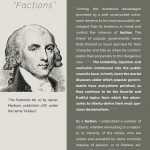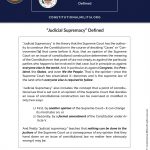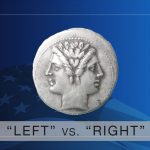Last Updated on October 3, 2021 by Constitutional Militia
According to the Congressional statute cited above, all of the Virginians at issue here are classified as members of “the unorganized militia”. So, first, Congress cannot deny that these people are members of one of “the Militia of the several States”—in this case, of Virginia—because the Constitution provides for no other “militia”. The President cannot deny it, either, because of his constitutional duty under Article II, Section 3 to “take Care that the Laws be faithfully executed”, including the purported “Law[ ]” defining “the unorganized militia”. And the Judiciary is bound by this classification, too, even in the Second Circuit. Second, Congress cannot pass legislation relating to how Virginia may organize, arm, and discipline her own “unorganized militia” for her own particular purposes. Third, a statute of Virginia which organizes, arms, and disciplines Virginians within her “unorganized militia” exclusively for Virginia’s own purposes cannot conceivably violate Article VI, Clause 2 of the Constitution (the so-called “Supremacy Clause”), because: (a) The Constitution explicitly provides for the permanent existence of “the Militia of the several States” as the States’ own establishments—and therefore no purported statute of Congress which contradicts that existence “shall be made in Pursuance [of the Constitution]”, as Article VI, Clause 2 requires. (b) Congress can exercise no power with respect to the Militia with regard to purposes other than the three listed in Article I, Section 8, Clause 15—and therefore, even if Congress could constitutionally provide that the Militia must be “unorganized” (and disarmed and undisciplined as well) for those three purposes, such a decree could have no effect as to all of the other purposes for which Virginia (or any other State) could call forth her Militia on her own. And (c) self-evidently, her Militia’s being organized, armed, and disciplined by Virginia herself for all of those other purposes beyond the authority of Congress could not possibly interfere with Congress’s determination to render the Militia unorganized, disarmed, and undisciplined for the three purposes over which alone it does have jurisdiction, even if such a determination were not (as it is) utterly unconstitutional. For the members of Virginia’s Militia organized, armed, and disciplined for Virginia’s parochial purposes could always report in an unorganized, unarmed, and undisciplined fashion if called forth to “be employed in the Service of the United States” for any of the three purposes for which Congress could provide for calling the Militia forth. In sum, how Virginia (or any other State) organizes, arms, and disciplines her own “unorganized militia” for her own purposes is entirely up to her.
Observe that none of this needs to be proven through reliance upon the indefinite guarantees of the Tenth Amendment, but instead is based upon the explicit constitutional identification of the Militia as “the Militia of the several States”, and the constitutional limitations on the purposes for which the Militia may be “call[ed] forth” “into the actual Service of the United States” under Article I, Section 8, Clauses 15 and 16, and Article II, Section 2, Clause 1. So, rather than needing proof from the Tenth Amendment, this analysis supplies a clear constitutional proof for the Amendment: namely, that on the face of the Constitution the power of the States with respect to the use of their own Militia for their own purposes is (as the Amendment recites) a “power[ ] not delegated to the United States by the Constitution, nor prohibited by it to the States, and [therefore is] reserved to the States respectively”.
The question then becomes, “What is to be done with this knowledge?” Plainly, nothing at all can be accomplished if one stubbornly adheres to “the individual-right theory” of the Second Amendment, and for that reason disregards not only the first thirteen words of the Amendment but the Militia Clauses of the original Constitution as well. If one puts aside such childish thoughts, though, much can be accomplished with relatively little effort.
Virginia (or any other constitutionally enlightened State) could enact a simple statute which revitalized her Militia in part, by providing that, for the purposes of “the security of a free State” specifically in Virginia, everyone in her own “unorganized militia” (other than conscientious objectors) must be armed, and must receive some minimal training in firearms safety and proficiency, or pay a fine to the Militia for noncompliance with those requirements. The statute would recognize that all of the members of “the unorganized militia” could not be expected to arm themselves with firearms of an uniform pattern at once. So, as an interim measure (which would be continued indefinitely as a fall-back position), the statute would declare that all of the firearms of whatever type possessed at the time the statute was enacted, or which would be acquired thereafter, by members of “the unorganized militia” who “registered” those arms with the State would be considered “Militia firearms” in satisfaction of the statutory requirement. (After all, every firearm can be made to perform some Militia function under some circumstances.) Thus, at one stroke, almost every firearm then in private possession or to come into private possession thereafter in the Commonwealth of Virginia would be infused with a public character and purpose, and with the legal protections which derive therefrom—specifically, the guarantees the Constitution provides to the Militia as integral, permanent parts of the federal system. As explained above, the General Government would have no legal authority to interfere with these arrangements—which, of course, is why every “gun-control” statute of the General Government now on the books contains an explicit exception, exemption, or exclusion for the States and their institutions and establishments.
The statutory mechanism could be very simple. In outline: Through a new Militia Office, Virginia would provide a standard form which consisted of pages on which members of her “unorganized militia” could list the firearms, ammunition, and various related accoutrements (such as telescopic sights, rangefinders, reloading machines and components, and so on) they possessed. Each page would be individually serial numbered, would contain a space for a notarized signature, and would have attached a perforated tab with the selfsame serial number and spaces for the individual’s name and address, his signature, and the document’s date of execution. A member of “the unorganized militia” would fill out as many pages as were necessary to “register” all of his equipment, sign and have notarized each of them, deliver the tabs to Virginia’s Militia Office, and retain the original completed pages (and such copies as he desired) in his personal possession in some secure location. (New lists could be prepared and confirming tabs submitted from year to year, month to month, or even day to day, as an individual acquired, or disposed of, firearms and other equipment.) Thus, each individual Virginian would know—and have a complete legal record of—exactly what firearms and other equipment he had dedicated to his Militia service, and when he had done so. But no public official would have any of that specific information—only a record that some firearms and equipment had been so dedicated by that individual as of some date. Thus, both the public service would be effectuated and individual privacy would be protected. Furthermore, in light of contemporary political conditions in this country the statute would provide that the actual lists of firearms and equipment would be absolutely immune from inspection by any public official other than an individual’s immediate superior in the Militia, and then only for the purpose of establishing that the individual had in fact dedicated a specific firearm or piece of equipment to his Militia service as of a certain date. Indeed, Virginia’s legislators would be wise explicitly to require the possessors of the lists, as part of their Militia duty, to refuse to disclose the contents of the lists to any and all parties not explicitly authorized by Virginia’s Militia laws, particularly if the demand for disclosure came from some rogue official of the General Government. Such a provision could not be faulted for supposedly promoting “obstruction of justice” (or some such alleged infraction), because the General Government could assert no possible legal claim to know anything about the internal workings of a Virginia’s “unorganized militia” with respect to its purely State purposes. That, after all, is how constitutionalism federalism with respect to the Militia is supposed to work.
Through such a statute, essentially all of the firearms in the private possession of individuals eligible for Virginia’s “unorganized militia” would become official “Militia firearms”, hypothecated for their possessors’ performance of duty in the Militia, and thus would be secured against almost all forms of contemporary “gun control”. And as long as so-called “assault rifles”, handguns with so-called “high-capacity” magazines, and so on were available in the marketplace, no one in Virginia eligible for her “unorganized militia” could be prevented from acquiring and possessing them simply because “gun-control” fanatics in Congress had enacted some new, all- encompassing unconstitutional statute to that effect, or some criminal resident of the White House had promulgated a purported “executive order” or other Diktat calling for compulsory “buy backs”, confiscations, forfeitures, or other surrenders or seizures of firearms in private hands.
Moreover, Virginia’s statute could also specify what should become the standard arms for her Militia in the future. These would be at least the various semi-automatic variants of true “assault rifles” and the most up-to- date pistols normally employed by the regular Armed Forces and contemporary police—with, of course, the best “high-capacity” magazines, the most effective ammunition, and so on added to the Militia’s new table of equipment. The statute could identify those arms both by names of particular manufacturers and specific models, as well as by general type or capability so as allow for new firearms to be included as they became available in the marketplace. It could also offer incentives for manufacturers of such equipment to locate their plants in Virginia. And if rogue officials in the General Government attempted to interdict a free market in firearms and ammunition for private individuals through spurious legislation enactedunder color of Article I, Section 8, Clause 3 of the Constitution (the so-called “Commerce Clause”), Virginia could supply such equipment to her “unorganized militia” directly, in the performance of a function which was “governmental”, not “commercial”, in nature, and therefore could not be “regulated” pursuant to that clause.As these words are being typed, no State has taken even the first step towards enacting legislation of the sort recommended here. But, as the Chinese expression has it, “a single spark can start a prairie fire”.
Other than requiring all members of her “unorganized militia” to be armed and minimally trained (or to obtain an exemption on the basis of conscientious objection), Virginia would not in this proposed statute call upon anyone actually to serve in some capacity in the Militia in the field. Provisions of that sort could be added later, as revitalization of the Militia expanded in scope, and the necessary more extensive amendments were made to Virginia’s Code.
Now, what rational gun owner who has seen what “gun-control” fanatics have accomplished in Congressional legislation since 1934 and in New York and Connecticut (among other benighted States) most recently, and who has come to understand that these revolutionaries intend to extend their totalitarian scheme of disarmament in order to eliminate “the security of a free State” everywhere throughout America, would not support the modest revitalization of the Militia proposed here? Would not even the National Rifle Association, as the self-appointed spokesman for gun owners which studiously avoids any mention of the Militia in its propaganda, have to favor it? Would not all advocates of the Second Amendment—including those who imagine that the Amendment consists of only fourteen words, rather than twenty-seven—have to favor it? If not, why not? Let the NRA and those advocates tell us.
To be sure, every “gun-control” fanatic living in Virginia and eligible for her “unorganized militia” would be sore distressed, because (unless he were a conscientious objector) he would have to possess a gun, or pay a fine—or emigrate from Virginia (preferably to North Korea, where his political point of view would be appreciated). For “gun-control” partisans in the Judiciary could not come to such an individual’s aid, because a fine is a form of internal Militia discipline, and by its own admission the Judiciary lacks the authority to oversee and regulate the discipline imposed by the Militia within the Militia. See Gilligan v. Morgan, 413 U.S. 1, 5-12 (1973).
Of course, as these words are being typed, no State has taken even the first step towards enacting legislation of the sort recommended here. But, as the Chinese expression has it, “a single spark can start a prairie fire”. Perhaps the latest “gun-control” decision from the Second Circuit will provide that spark, and articles such as this the tinder. Surely it is better to light one candle in this manner than to continue to curse without practical effect the ever- deepening darkness.
©2015 Edwin Vieira, Jr. – All Rights Reserved.



































